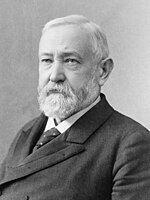
Back انتخابات الرئاسة الأمريكية 1888 Arabic ھەڵبژاردنی سەرۆکایەتیی ویلایەتە یەکگرتووەکانی ئەمریکا (١٨٨٨) CKB Præsidentvalget i USA 1888 Danish Präsidentschaftswahl in den Vereinigten Staaten 1888 German Elecciones presidenciales de Estados Unidos de 1888 Spanish Yhdysvaltain presidentinvaalit 1888 Finnish Élection présidentielle américaine de 1888 French הבחירות לנשיאות ארצות הברית 1888 HE Elezioni presidenziali negli Stati Uniti d'America del 1888 Italian 1888年アメリカ合衆国大統領選挙 Japanese
| |||||||||||||||||||||||||||||
401 members of the Electoral College 201 electoral votes needed to win | |||||||||||||||||||||||||||||
|---|---|---|---|---|---|---|---|---|---|---|---|---|---|---|---|---|---|---|---|---|---|---|---|---|---|---|---|---|---|
| Turnout | 80.5%[1] | ||||||||||||||||||||||||||||
| |||||||||||||||||||||||||||||
 Presidential election results map. Red denotes those won by Harrison/Morton, blue denotes states won by Cleveland/Thurman. Numbers indicate the number of electoral votes allotted to each state. | |||||||||||||||||||||||||||||
| |||||||||||||||||||||||||||||
Presidential elections were held in the United States on November 6, 1888. Republican nominee Benjamin Harrison, a former U.S. senator from Indiana, narrowly defeated incumbent Democratic President Grover Cleveland of New York. It was the third of five U.S. presidential elections (and second within 12 years) in which the winner did not win the national popular vote, which would not occur again until the 2000 US presidential election. Cleveland was the last incumbent Democratic president to lose reelection until Jimmy Carter in 1980.
Cleveland, only the second Democratic president since the American Civil War (the first being Andrew Johnson) and the first elected as president (Johnson assumed office after Lincoln's assassination, and left at the end of the term), was unanimously renominated at the 1888 Democratic National Convention. Harrison, the grandson of former President William Henry Harrison, emerged as the Republican nominee on the eighth ballot of the 1888 Republican National Convention. He defeated other prominent party leaders such as Ohio Senator John Sherman and former Michigan Governor Russell Alger. This was the first election since 1840 in which an incumbent president lost reelection.
Tariff policy was the principal issue in the election, as Cleveland had proposed a dramatic reduction in tariffs, arguing that high tariffs were unfair to consumers. Harrison took the side of industrialists and factory workers who wanted to keep tariffs high. Cleveland's opposition to American Civil War pensions and inflated currency also made enemies among veterans and farmers. On the other hand, he held a strong hand in the Southern United States and the border states, and appealed to former Republican Mugwumps.
Cleveland won a small plurality of the popular vote, but Harrison won the election with a majority in the Electoral College, marking the only time (as of 2024) in which an incumbent president of either party lost a reelection bid despite winning the popular vote. Harrison swept almost the entire North and Midwest, including narrowly carrying the swing states of New York and Indiana. This was the first time since 1856 that Democrats won the popular vote in consecutive elections.
- ^ "National General Election VEP Turnout Rates, 1789–Present". United States Election Project. CQ Press.

